 |
|---|
Early general elections were held in Sweden in March and April 1887, having not been due until the autumn. [1] They had been called following a debate over rye tariffs, and became known as the "tariff election". [1]
 |
|---|
Early general elections were held in Sweden in March and April 1887, having not been due until the autumn. [1] They had been called following a debate over rye tariffs, and became known as the "tariff election". [1]
Tariffs had become a major political issue in Sweden during the mid-1880s. In 1885 a campaign for tariffs to be introduced on grain was rejected by both chambers of the Riksdag. The following year the issue was debated again, and whilst the Second Chamber approved their introduction, the First Chamber rejected them. The matter was settled when a joint sitting of the two chambers rejected the initiative. [1]
In 1887 a tariff on rye was voted down 70–68 in the First Chamber, which went on to vote down all other tariffs. [1] The Second Chamber then approved the rye tariff by 111–101. With it looking as if the tariff proposal would be passed at a joint sitting, King Oscar II dissolved Parliament with the support of Prime Minister Robert Themptander, and called fresh elections. [1]
An intensive election campaign led to a large increase in voter turnout; since the changes to the electoral system in 1866 turnout had always been below 25%, but for this election it was 48%. [1] Only 21.9% of the male population aged over 21 was eligible to vote. [2]
| Party | Votes | % | Seats | |
|---|---|---|---|---|
| Free traders | 76,025 | 58.61 | 102 | |
| Protectionists | 53,692 | 41.39 | 112 | |
| Total | 129,717 | 100.00 | 214 | |
| Registered voters/turnout | 274,733 | – | ||
| Source: Mackie & Rose [3] | ||||
Following the spring elections, some MPs attempted to delay a decision on tariffs by proposing that a commission of inquiry be set up. Although this was supported by Themptander, Parliament rejected the idea. [1]
Despite the Spring elections, the scheduled August and September elections still went ahead, resulting in another victory for the free trade bloc, albeit with a reduced majority. [1]
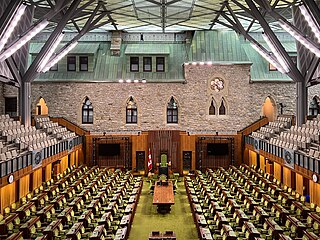
The House of Commons of Canada is the lower house of the Parliament of Canada. Together with the Crown and the Senate of Canada, they comprise the bicameral legislature of Canada.
Bicameralism is a type of legislature that is divided into two separate assemblies, chambers, or houses, known as a bicameral legislature. Bicameralism is distinguished from unicameralism, in which all members deliberate and vote as a single group. As of 2022, roughly 40% of the world's national legislatures are bicameral, while unicameralism represents 60% nationally and much more at the subnational level.
The period following the accession of Oscar II to the throne of Sweden in 1872 was marked by political conflict. The Lantmanna Party, representing peasant proprietors, dominated the Lower House of parliament, and demanded tax reductions and reforms of the system of military service. The Upper House opposed these positions. A compromise was reached in 1884 with reduction in land taxes and increased periods of military service, processes that continued in later years.

The Parliament of Australia is the federal legislature of Australia. It consists of three elements: the monarch of Australia, the Senate, and the House of Representatives. It combines elements from the Westminster system, in which the party or coalition with a majority in the lower house is entitled to form a government, and the United States Congress, which affords equal representation to each of the states, and scrutinises legislation before it can be signed into law.

The House of Representatives is the sole chamber of the New Zealand Parliament. The House passes laws, provides ministers to form the Cabinet, and supervises the work of government. It is also responsible for adopting the state's budgets and approving the state's accounts.

Referendums in the United Kingdom are occasionally held at a national, regional or local level. Historically, national referendums are rare due to the long-standing principle of parliamentary sovereignty. Legally there is no constitutional requirement to hold a national referendum for any purpose or on any issue. However, the UK Parliament is free to legislate through an Act of Parliament for a referendum to be held on any question at any time.

The Parliament of Victoria is the bicameral legislature of the Australian state of Victoria that follows a Westminster-derived parliamentary system. It consists of the King, represented by the governor of Victoria, the Legislative Assembly and the Legislative Council. It has a fused executive drawn from members of both chambers. The parliament meets at Parliament House in the state capital Melbourne. The current Parliament was elected on 26 November 2022, sworn in on 20 December 2022 and is the 60th parliament in Victoria.
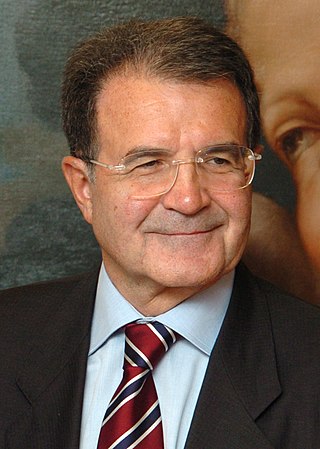
The 2006 Italian general election was held on 9 and 10 April 2006. Romano Prodi, leader of the centre-left coalition The Union, narrowly defeated the incumbent Prime Minister Silvio Berlusconi, leader of the centre-right coalition House of Freedoms. Initial exit polls suggested a victory for Prodi, but the results narrowed as the count progressed. On 11 April 2006, Prodi declared victory; Berlusconi never conceded defeat and an ensuing dispute formed.
A double dissolution is a procedure permitted under the Australian Constitution to resolve deadlocks in the bicameral Parliament of Australia between the House of Representatives and the Senate. A double dissolution is the only circumstance in which the entire Senate can be dissolved.

Elections in Portugal are free, fair, and regularly held, in accordance with election law.
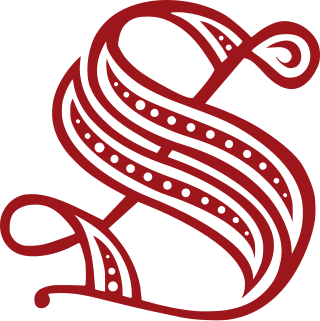
The Italian Parliament is the national parliament of the Italian Republic. It is the representative body of Italian citizens and is the successor to the Parliament of the Kingdom of Sardinia (1848–1861), the Parliament of the Kingdom of Italy (1861–1943), the transitional National Council (1945–1946) and the Constituent Assembly (1946–1948). It is a bicameral legislature with 600 elected members and a small number of unelected members. The Italian Parliament is composed of the Chamber of Deputies, as well as the Senate of the Republic.

Oscar Robert Themptander was a Swedish politician and public official who was Prime Minister of Sweden from 1884 to 1888 during the reign of King Oscar II, and Governor of Stockholm County from 1888 to 1896. He was also minister for finance.

The Joint Sitting of the Parliament of Australiaof 1974 remains the only time that members of both houses of the federal parliament of Australia, the Senate and House of Representatives, have sat together as a single legislative body pursuant to section 57 of the Constitution. The joint sitting was held on 6 and 7 August 1974, following the double dissolution 1974 federal election.
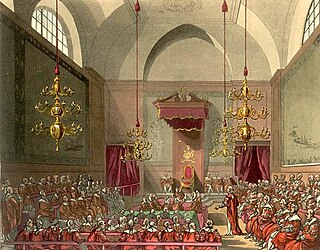
The reform of the House of Lords, the upper house of the Parliament of the United Kingdom, has been a topic of discussion in UK politics for more than a century. Multiple governments have attempted reform, beginning with the introduction of the Parliament Act 1911 by the incumbent Liberal Government. When the Labour Party came to power in the 1997 general election, the Blair government passed the House of Lords Act 1999. On 7 November 2001 the government undertook a public consultation. This helped to create a public debate on the issue of Lords reform, with 1,101 consultation responses and numerous debates in Parliament and the media. However, no consensus on the future of the upper chamber emerged.
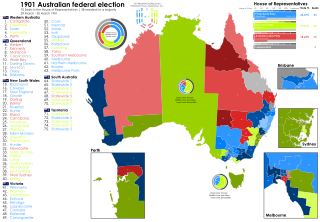
The 1901 Australian federal election for the inaugural Parliament of Australia was held in Australia on Friday 29 March and Saturday 30 March 1901. The elections followed Federation and the establishment of the Commonwealth of Australia on 1 January 1901. All 75 seats in the Australian House of Representatives, six of which were uncontested, as well as all 36 seats in the Australian Senate, were up for election.

The Chamber of Representatives is one of the two chambers in the bicameral Federal Parliament of Belgium, the other being the Senate. It is considered to be the "lower house" of the Federal Parliament.

The Tricameral Parliament, officially the Parliament of the Republic of South Africa, was the legislature of South Africa between 1984 and 1994, established by the South African Constitution of 1983, which gave a limited political voice to the country's Coloured and Indian population groups. The majority African population group was however still excluded, their interests notionally represented in the governments of the black homelands, or "bantustans", of which they were formally citizens. As the bantustans were largely politically impotent, its principal effect was to further entrench the political power of the White section of the South African population.

The Duchy of Nassau was an independent state between 1806 and 1866, located in what became the German states of Rhineland-Palatinate and Hesse. It was a member of the Confederation of the Rhine and later of the German Confederation. Its ruling dynasty, later extinct, was the House of Nassau. The duchy was named for its historical core city, Nassau, although Wiesbaden rather than Nassau was its capital. In 1865, the Duchy of Nassau had 465,636 inhabitants. After being occupied and annexed into the Kingdom of Prussia in 1866 following the Austro-Prussian War, it was incorporated into the Province of Hesse-Nassau. The area is a geographical and historical region, Nassau, and Nassau is also the name of the Nassau Nature Park within the borders of the former duchy.
A joint session or joint convention is, most broadly, when two normally separate decision-making groups meet, often in a special session or other extraordinary meeting, for a specific purpose.

General elections were held in Sweden in August and September 1887. Although they resulted in a victory for the pro-free trade bloc, 22 of its members were later expelled from parliament, giving the protectionist members a majority.